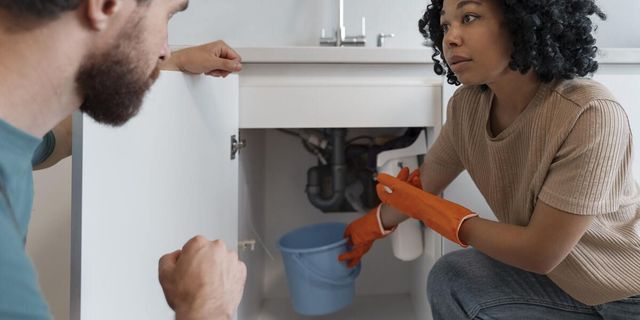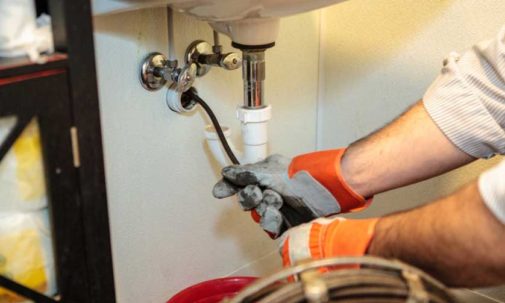Emergency Solutions to Follow Until Professional Help Arrives
Emergency Solutions to Follow Until Professional Help Arrives
Blog Article
This post listed below relating to Expert Tips for Emergency Plumbing Repairs is highly entertaining. You should read it.

Pipes emergency situations can strike any time, creating stress and anxiety and possible damages to your home. Whether it's a ruptured pipeline, a clogged drain, or a dripping tap, recognizing just how to take care of the scenario up until an expert plumbing technician gets here can conserve you from additional problems. This article provides important emergency pipes pointers to aid you minimize damages and reclaim control throughout a pipes dilemma.
Shut off the Supply Of Water
The initial step in any plumbing emergency is to shut down the water. For local problems, such as a leaking faucet or commode, switch off the shutoff near the fixture. In the case of a major leakage or ruptured pipe, locate your home's main water shut-off shutoff and transform it off right away. Understanding the location of these shutoffs ahead of time can save beneficial time throughout an emergency.
Address Tiny Leaks with Short-lived Fixes
Tiny leaks can quickly end up being significant troubles if left unattended. Utilize these short-term solutions up until professional help gets here:
While these repairs aren't permanent, they can aid reduce water loss and damages.
Unclog Drains Safely
A clogged up drain can be a frustrating and untidy concern. Right here's just how to tackle it:
If these techniques do not work, stay clear of using extreme pressure, as it may aggravate the clog.
Handle Overflowing Toilets
An overruning toilet can trigger prompt chaos. Right here's what you must do:
Shut Off Your Water Heater
In certain emergencies, such as a burst pipe, it's a good idea to shut off your water heater. This avoids overheating or damage to the unit when water stops flowing. Turn off the power supply to the water heater (electrical or gas) and allow it cool to stay clear of prospective dangers.
Briefly Quit a Burst Pipe
A burst pipe can lead to substantial water damages in mins. To mitigate the issue:
Call an expert plumbing instantly to address the issue permanently.
Deal With Frozen Pipes Meticulously
In cooler environments, icy pipes are a common emergency. If you suspect an icy pipeline:
Protect against Additional Damage
Taking quick activity to lessen damage can save you money and time over time. Here's just how:
. Have an Emergency Plumbing Package
Prepare a fundamental plumbing emergency situation kit to take care of small problems properly. Your set needs to include:
Having these tools accessible can make a considerable distinction in your capability to manage emergency situations.
Know When to Call a Professional.
While quick fixes can assist temporarily, specific plumbing problems require instant professional interest. Call a plumber if:.
Promptly calling an expert makes certain the issue is dealt with properly and stops more difficulties.
Conclusion.
Plumbing emergencies can be overwhelming, but with the ideal expertise and devices, you can take care of the situation effectively up until assistance shows up. By switching off the water system, resolving tiny leakages, and using temporary fixes, you can reduce damage and keep your home safe. Keep in mind, these ideas are momentary options; constantly get in touch with a qualified plumbing technician to manage the source of the issue. Prep work and fast reasoning are your finest allies in any type of plumbing emergency.
8 Helpful Tips for Managing Plumbing Emergencies at Home
If your plumbing system hasn’t failed once, wait for it because almost everyone has a story to tell. Sometimes, it could be simple emergencies such as a leaking pipe, a blocked cistern, or even a big burst pipe. In situations like this, you need to have some handy tips to save you some money and from possible damages.
Take care of minor issues early.
Sometimes, you could have avoided an emergency by taking proactive measures while it was still early. Some major plumbing emergencies can be a result of an ignored minor issue. We recommend that you have items like plumbing tapes and other related items. A plumbing tape can allow you to manage minor leaks before the plumber arrives.
Cut off the water supply.
This tip is essential in almost any type of leakage problem. For problems like minor leakages in the toilet or kitchen, turn off the supply that takes water to the affected pipes. If the leakage is a major pipe, you must shut off the supply valve to the entire building. This will help you avoid flooding your home and neighbors if you share a flat.
Know your plumbing system
Folks typically move into a new apartment without understanding the water supply around the building. This can prove disastrous if a water emergency arises and the plumber is far away. The previous tip will prove useless if you don’t practice this one. More importantly, know where your water shut-off valve is located – you’ll need that knowledge to prevent potential home floods.
Have some common handy tools
There are lots of plumbing emergencies that you can handle without hiring a plumber. That’s why you must keep some tools available always. Some tools that you can use to fix simple plumbing emergencies easily include plumbing tapes, screwdrivers, thread seal tapes, plungers, pliers, tape measures, and rubber gloves.
Insulate your pipes from cold
You’ll save yourself from many plumbing expenses if you protect your water pipes from the cold. This is because of the harmful effects that cold weather can have on your pipes. During winter, your pipes can burst from being overly expected to freezing temperatures. So, make sure insulators are there to keep the pipes working correctly.
Avoid practices that will clog your toilet.
Many people indulge in practices that can damage the plumbing system of the entire building. One of these is when they use their toilet to dispose-off garbage. They flush all kinds of things, such as paper towels, bandages, hairs, female sanitary products, etc., down the toilet. This will block your toilet in the long run, incurring unnecessary expenditures. Dump such waste in the trash instead.
Check your dials regularly.
Sometimes, there could be leakages in your home without noticing them in time. So, constantly monitor your water meter dial. If the dial is reading when there is nobody using water, this is an indicator that there is leaking. Check for leaks immediately. Call a plumber as soon as possible if you can’t find any.
https://www.constructionplacements.com/8-helpful-tips-for-managing-plumbing-emergencies-at-home/

We had been shown that editorial about through a buddy on our other web address. In case you enjoyed our page if you please be sure to pass it around. Thanks a bunch for being here. Kindly pay a visit to our blog back soon.
Check This Out Report this page